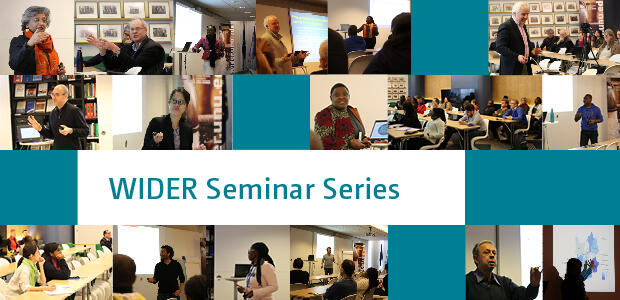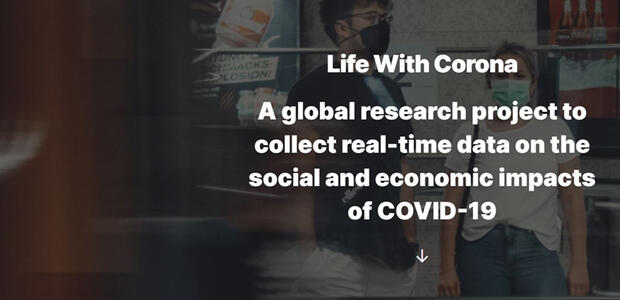Working Paper
The role of trust and of poverty in compliance with social distancing measures in Africa during the COVID-19 pandemic
Since it began, the COVID-19 pandemic has imposed a number of challenges on Africa and the rest of the world. Following the recommendations of the World Health Organization, many countries imposed social distancing measures and cancelled non...
Working Paper
Ethnic diversity and informal work in Ghana
We present the first study that examines the effects of ethnic diversity on informal work. Using two waves of data from the Ghana Socioeconomic Panel Survey, we find that ethnic diversity is associated with a higher probability of engaging in...
Working Paper
Intergroup contact and its effects on discriminatory attitudes
The contact hypothesis posits that having diverse neighbours may reduce one’s intergroup prejudice. This hypothesis is difficult to test as individuals self-select into neighbourhoods. Using a slum relocation programme in India that randomly assigned...
Working Paper
‘Ask not what your country can do for you’
This paper investigates how persistent changes in trust caused by the Great Recession have affected how governments and citizens across Europe responded to the next global crisis: the COVID-19 pandemic.We show that increases in individualism and...
Working Paper
Trust a few: natural disasters and the formation of trust in Africa
Individuals are at their most mental plasticity in their impressionable years (ages 18–25 years) forming long-term attitudes and behaviours essential to functioning in a society, such as trust.In this paper we ask how exposure to natural disasters...
Research Brief
The prolonged effects of terrorism
Terrorist violence has a profound influence on social attitudes, including trust in governmental institutions and attitudes towards migration and civil freedoms. Acts of terrorism cause citizens to experience a complex range of negative emotions...
Working Paper
Who trusts?
In the developing world, clientelism is common. In Africa, public office is often used to redistribute resources to ethnically defined constituencies, and this form of clientelistic exchange is a key determinant of vote choice. Does clientelistic...
Working Paper
How does joint evolution of social trust and land administration shape economic outcomes?
This paper examines how the interaction of social trust and institutions, such as land administration, affects household economic decisions in Vietnam. Using a panel dataset of rural households from 2008 to 2014, we show that negative consequences of...
Working Paper
Key behavioural characteristics of small-business owners
This study investigates the role of owners’ personal preferences and behaviour in determining the success of micro, small and medium-sized enterprises using a lab-in-the-field experiment with small-business owners in Myanmar. The study is a...
Rule of Law Day
On 26 October the Rule of Law center hosts Rule of Law Day at the University of Helsinki's City Centre Campus and online. This event is an integral part of the Rule of Law Centre's commitment to fostering dialogue on international development...
Thu, 26 October 2023
University of Helsinki's City Centre Campus,
Helsinki,
Finland
Past event
Panel discussion
UNU-WIDER at ISA 2022 Annual Convention
UNU-WIDER Senior Research Fellow Patricia Justino and Research Associate Rute Martins Caeiro join in a virtual panel discussion Trust and Governance in Unstable Democracies on 29 March 2022 14:00 - 15:30 (UTC-5) as part of the International Studies...
Tue, 29 March 2022
Online,
Nashville,
United States
Past event
Project workshop
Inequality and governance in unstable democracies – the mediating role of trust: 2nd Annual Workshop
More than 30 participants attended the 2nd annual workshop for ‘Trust and Governance’ project, held virtually on the 16th and 17th April 2020. The workshop was initially set to be held in Colombia but had to be moved to a virtual environment through...
Thu, 16 April 2020
–
Fri, 17 April 2020
Virtual (Zoom),
Past event
Working Paper
Riots and social capital in urban India
This paper explores the relationship between household exposure to riots and social capital in urban India using a panel dataset collected by the authors in the state of Maharashtra. The analysis applies a random-effect model with lagged covariates...
Working Paper
Africa’s lockdown dilemma
The primary policy response to suppress the spread of COVID-19 in high-income countries has been to lock down large sections of the population. However, there is growing unease that blindly replicating these policies might inflict irreparable damage...
Working Paper
Trust in the time of corona
The global spread of COVID-19 is one of the largest threats to people and governments since the Second World War. The on-going pandemic and its countermeasures have led to varying physical, psychological, and emotional experiences, shaping not just...
Blog
Beyond lockdown: rebuilding the social contract
Continued lockdown measures are straining the social contract between citizens and governments. As this column explains, in contexts where there are...
Working Paper
Trust as state capacity
This paper explores the link between trust in government, policy-making, and compliance. It focuses on a specific channel whereby citizens who are convinced that a policy is worthwhile are more motivated to comply with it. This in turn reduces the...
Working Paper
Trust the hand that protects you—Does UN peacekeeping harm post-conflict governments’ legitimacy?
Rebuilding state legitimacy is a thorny challenge in the aftermath of civil wars. The international community has stepped in to support post-conflict states in rebuilding state capacity, sometimes replacing governments in providing public goods. Most...
Working Paper
The social and political consequences of wartime sexual violence
Wartime sexual violence is widespread across conflict zones and thought to leave a disastrous legacy for survivors, communities, and nations. Yet, systematic studies on i) the prevalence and ii) the social and political consequences of wartime sexual...
Working Paper
The legacies of armed conflict: insights from stayees and returning forced migrants
How does conflict, displacement, and return shape trust, reconciliation, and community engagement? And what is the relative impact of exposure to violence on these indicators? In this paper we explore these questions by focusing on the legacies of...
Working Paper
‘Ten pound touts’: post-conflict trust and the legacy of counterinsurgency in Northern Ireland
This paper explores the legacies of wartime rebel governance and counterinsurgency tactics. Insurgents rely on civilian support for resources, information, and cover. To defeat insurgents, the state attempts to extract information from communities...
Working Paper
Trust in institutions and the profile of inequality
This paper investigates the importance of accounting for the profile of inequality in the analysis of institutional trust. Drawing on individual data from 82 countries around the world over the 1981–2021 period, it sheds light on the potential...
Working Paper
Institutional trust in the time of corona
We study how the stringency of policy measures to counter the COVID-19 pandemic affects individuals’ trust in formal institutions. Drawing on micro-level panel data from Germany spanning an 18-month period from the onset of the pandemic, we show that...
Working Paper
The legacy of Mexico’s Drug War on youth political attitudes
We investigate the impact of childhood exposure to organized criminal violence on sociopolitical attitudes in Mexico, where an entire generation of youths has been raised amid the country’s most violent conflict over the past century. We fielded an...
Journal Article
Africa’s lockdown dilemma
As the COVID-19 pandemic unfolded, sub-Saharan African countries faced the dilemma of how to minimize viral transmission without adversely affecting the poor. This study proposes an index of lockdown readiness, taking into account housing conditions...
Working Paper
Nation building in post-conflict settings
How do states rebuild nations after a major conflict? Truth and Reconciliation Commissions (TRCs) have emerged as one of the most common interventions to achieve this objective. Despite their popularity, little is known about their efficacy to foster...

 Join the network
Join the network







